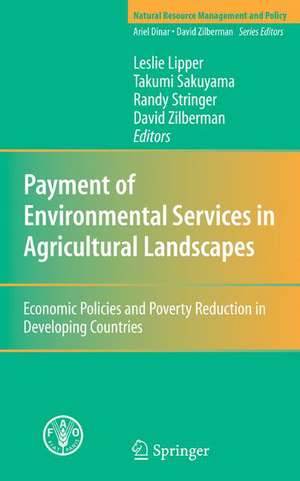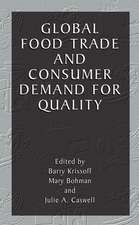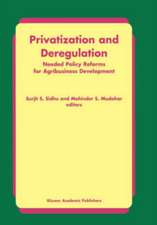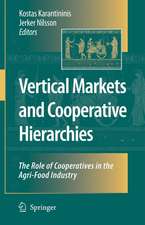Payment for Environmental Services in Agricultural Landscapes: Economic Policies and Poverty Reduction in Developing Countries: Natural Resource Management and Policy, cartea 31
Editat de Leslie Lipper, Takumi Sakuyama, Randy Stringer, David Zilbermanen Limba Engleză Hardback – 2 dec 2008
This book is a co-publication between Springer and the Food and Agriculture Organization of the United Nations.
Din seria Natural Resource Management and Policy
- 18%
 Preț: 1226.24 lei
Preț: 1226.24 lei - 18%
 Preț: 958.56 lei
Preț: 958.56 lei - 18%
 Preț: 958.38 lei
Preț: 958.38 lei - 18%
 Preț: 1223.74 lei
Preț: 1223.74 lei - 18%
 Preț: 948.29 lei
Preț: 948.29 lei - 15%
 Preț: 641.03 lei
Preț: 641.03 lei - 18%
 Preț: 954.93 lei
Preț: 954.93 lei - 15%
 Preț: 646.43 lei
Preț: 646.43 lei - 18%
 Preț: 955.08 lei
Preț: 955.08 lei - 18%
 Preț: 1233.37 lei
Preț: 1233.37 lei - 15%
 Preț: 651.84 lei
Preț: 651.84 lei - 18%
 Preț: 951.47 lei
Preț: 951.47 lei - 18%
 Preț: 1229.73 lei
Preț: 1229.73 lei - 18%
 Preț: 1229.28 lei
Preț: 1229.28 lei - 15%
 Preț: 643.00 lei
Preț: 643.00 lei - 18%
 Preț: 1237.14 lei
Preț: 1237.14 lei - 15%
 Preț: 645.79 lei
Preț: 645.79 lei - 15%
 Preț: 650.86 lei
Preț: 650.86 lei - 15%
 Preț: 653.14 lei
Preț: 653.14 lei - 18%
 Preț: 1233.52 lei
Preț: 1233.52 lei - 18%
 Preț: 1233.20 lei
Preț: 1233.20 lei - 18%
 Preț: 950.96 lei
Preț: 950.96 lei - 18%
 Preț: 1242.21 lei
Preț: 1242.21 lei - 18%
 Preț: 951.29 lei
Preț: 951.29 lei - 18%
 Preț: 1551.11 lei
Preț: 1551.11 lei
Preț: 1222.01 lei
Preț vechi: 1490.25 lei
-18% Nou
Puncte Express: 1833
Preț estimativ în valută:
233.84€ • 250.05$ • 194.96£
233.84€ • 250.05$ • 194.96£
Carte tipărită la comandă
Livrare economică 17 aprilie-01 mai
Preluare comenzi: 021 569.72.76
Specificații
ISBN-13: 9780387729695
ISBN-10: 0387729690
Pagini: 283
Ilustrații: XVI, 284 p. 35 illus.
Dimensiuni: 155 x 235 x 20 mm
Greutate: 0.57 kg
Ediția:2009
Editura: Springer
Colecția Springer
Seria Natural Resource Management and Policy
Locul publicării:New York, NY, United States
ISBN-10: 0387729690
Pagini: 283
Ilustrații: XVI, 284 p. 35 illus.
Dimensiuni: 155 x 235 x 20 mm
Greutate: 0.57 kg
Ediția:2009
Editura: Springer
Colecția Springer
Seria Natural Resource Management and Policy
Locul publicării:New York, NY, United States
Public țintă
ResearchCuprins
and Overview.- Putting Payments for Environmental Services in the Context of Economic Development.- Designing Payments for Environmental Services with Weak Property Rights and External Interests.- Marketing Environmental Services.- Economics of Carbon Sequestration Projects Involving Smallholders.- Conservation Payments to Reduce Wildlife Habitat Fragmentation and Disease Risks.- Payments for Ecosystem Services, Poverty and Sustainability: The Case of Agricultural Soil Carbon Sequestration.- Lessons Learned from Mexico’s Payment for Environmental Services Program.- Agricultural Landscape Externalities, Agro-Tourism, and Rural Poverty Reduction in Morocco.- Exploring Environmental Services Incentive Policies for the Philippines Rice Sector: The Case of Intra-Species Agrobiodiversity Conservation.- Assessing the Feasibility of Wetlands Conservation: Using Payments for Ecosystem Services in Pallisa, Uganda.- Managing Wildlife Damage to Agriculture in Bhutan: Conflicts, Costs and Compromise.- Conclusion.
Textul de pe ultima copertă
In recent years, development policy has responded to an increasing concern about natural resource degradation by setting up innovative payment for environmental services (PES) programs in developing countries. PES programs use market and institutional incentives in order to meet both environmental and poverty alleviation objectives. However, their optimal design, implications for the rural poor, and how these initiatives integrate into international treaties on global warming and biodiversity loss are still being discussed. This book addresses these issues by scrutinizing analytical tools, providing policy insights and stimulating debate on linkages between poverty alleviation and environmental protection. In particular, it turns attention towards the role of environmental services in agricultural landscapes as they provide a living for many poor in developing countries. It serves as a valuable reference for academics and students in various disciplines, as well as for policy makers and advisors.
Caracteristici
One of the first books to focus on the effects of payment for environmental service (PES) programs on the rural poor Peer-reviewed contributions from experts in the fields





















